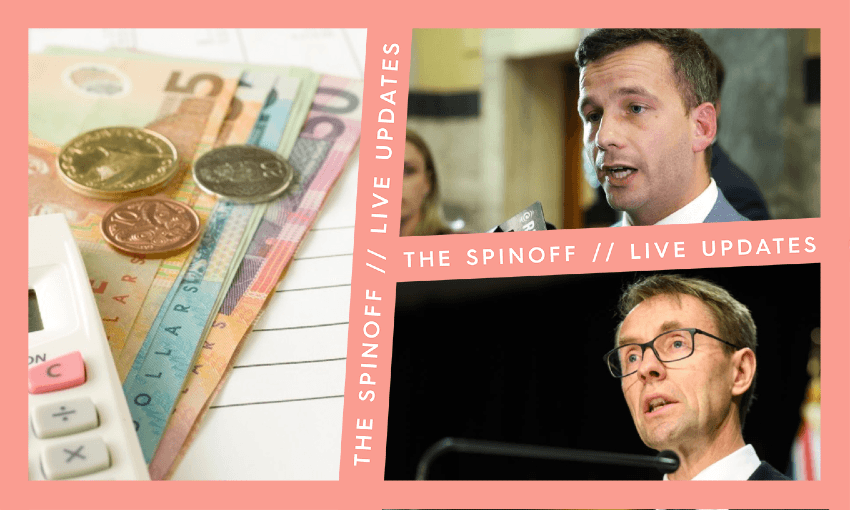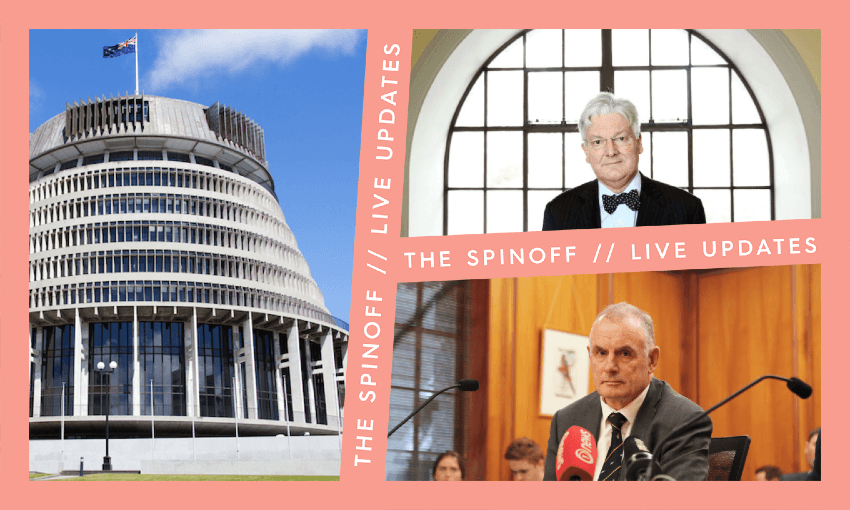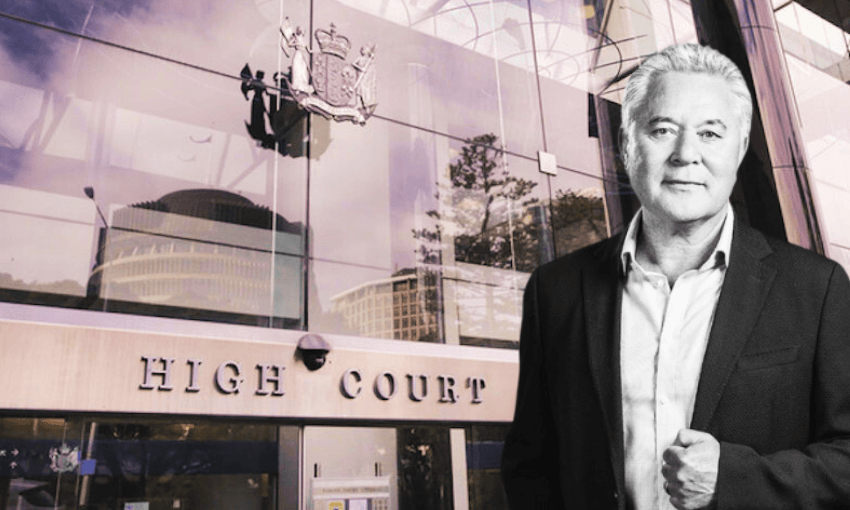Welcome to The Spinoff’s live updates for May 7, bringing you the latest news updated throughout the day. Get in touch at stewart@thespinoff.co.nz
5.15pm: Person moved to MIQ after possible contact with Covid case
A person has been transferred to managed isolation in Christchurch after they were linked to a case of Covid-19 in Sydney.
“This person attended a location of interest at the same time as one of the two positive cases recently identified in Sydney,” said a Ministry of Health spokesperson.
The contact is being tested for Covid-19 and the results will be available by tomorrow. “The person is not symptomatic and local public health staff say they have cooperated fully with all requests.”
As of this afternoon, no new locally acquired cases have been identified in New South Wales since two cases were identified earlier this week.
5.10pm: Man arrested after threats to National MP
A 25-year-old man has been arrested for threatening to kill National MP Simeon Brown.
The man was arrested today at a Lower Hutt property, according to a statement from police.
“I would like to acknowledge the outstanding work of our staff from both the Criminal Investigation Branch in Counties Manukau, where the original complaint was received, and the team in Lower Hutt who located the alleged offender today,” said detective inspector Darrell Harpur.
The man is due to appear in the Hutt Valley District Court on Thursday.
4.00pm: Drought responsible for 3% drop in sheep numbers
The number of sheep in New Zealand fell by 800,000 in the year ending June 2020, new stats reveal.
The year-on-year drop represents just a 3% drop from 2019, taking the overall number of sheep to a mere 26 million. That’s a dramatic difference, however, from peak sheep: 70 million in 1982.
It’s believed the drop in numbers is due to a 2020 drought that caused feed shortages. “Hawke’s Bay had the largest decrease, with the total number of sheep falling by 12% (346,000) from the previous year to a total of 2.5 million as at June 2020,” said Stats NZ’s Ana Krpo.
2.45pm: PSA releases open letter after three-year pay freeze
The Public Service Association has released an open letter calling on the government to rethink its three year pay freeze for public servants.
“Public workers around the country have responded to your announcement with resounding and unprecedented strength. They have asked us to provide you with a clear message from them: That your pay restrictions at this time are unacceptable and show that your government does not value them,” the letter, sent to Chris Hipkins, reads.
“That this does not acknowledge the work they are doing to support New Zealand through the pandemic and to address the pressing policy priorities your government has tasked them work working on, including: reducing child poverty; the cost and supply of housing; health inequities and New Zealand’s infrastructure deficit.”
The association is seeking a meeting with Hipkins, who they claim has ignored previous requests to engage on the matter.
1.30pm: ‘The biggest workplace change in decades’
E Tū, New Zealand’s biggest private sector union, has welcomed this afternoon’s announcement around plans to implement Fair Pay Agreement legislation.
“This will be the best change at workplaces in decades,” assistant national secretary Annie Newman said in a statement. “Setting fair wages and conditions across the board will stop the race to the bottom, which sees employers competing for contracts by paying poverty wages.”
BusinessNZ takes a very different view in a statement saying the FPA plan “should be terminated”.
“There would be nothing ‘fair’ about Fair Pay Agreements,” chief executive Kirk Hope said. “Any pay deals reached wouldn’t be fair because the process is essentially compulsory – employers would be required to agree to what unions wanted, with compulsory arbitration if they didn’t.”
The National Party has pledged to repeal the proposed legislation. “Labour stuck in 1970s with National Awards 2.0,” goes the headline on their media release.
1.05pm: No new community Covid-19 cases after Sydney outbreak
Apologies for the double 1pm news – this has just arrived from the Ministry of Health:
There are no new community cases of Covid-19 in New Zealand following a new Sydney outbreak that triggered a pause to quarantine-free travel.
There is one new case to report in a recent returnee in our managed isolation facilities. Three previously reported cases have now recovered. The total number of active cases in New Zealand today is 26.
In a statement, the Ministry of Health said it remained in contact with its Australian counterparts following the confirmation of two positive Covid-19 cases.
“Quarantine-free travel from New South Wales to New Zealand was paused from 11:59pm last night as a precautionary measure as investigations continue into the source of these infections,” a spokesperson said.
“Anyone in New Zealand who has been at any of the locations of interest at the specified times should contact Healthline on 0800 358 5453, immediately self-isolate and be tested.”
Meanwhile, all 32 people in New Zealand who have self-identified as being in a location of interest in Brisbane following a recent “green zone breach” have now been followed up. “Of these, 25 have returned negative test results. Two people have returned to Australia, and health authorities have assessed the remaining five people and advised that they do not require any further action,” said the ministry.
1.00pm: Fair pay legislation set to overhaul employment relations
The government has announced a major overhaul of our employment relations law, with the introduction of promised “fair pay agreement” legislation.
The law itself is yet to be drafted and won’t be introduced to the house until later this year.
The announcement comes in a week where the government has faced intense scrutiny over its decision to freeze the pay of public servants for three years.
“For too long New Zealanders working in critical roles like cleaners, supermarket workers, and bus drivers whose work was essential to keep our country going during the pandemic, have been undervalued by our workplace relations system,” said workplace relations minister Michael Wood. “Fair pay agreements are about turning that around and ensuring that working kiwis get a fair go again.”
Fair pay agreements are designed for industries where workers have struggled to negotiate pay and conditions. The cabinet paper provides that the Public Service Commissioner take responsibility for (or delegate to relevant sector executives) any fair pay agreement bargaining covering employees in the public service and education sector.
Unions have pointed to the likes of security guards, retail workers and bus drivers as the kind of roles that could benefit from a fair pay agreement.
The paper stipulates that any union will be able to initiate the fair pay agreement process “as long as they can demonstrate support from either 10% or 1,000 employees in the proposed industry or occupation”.
The process could also be initiated via a “public interest test” in an industry or occupation where employment issues exist, such as low pay or limited bargaining power.
“The parties bargaining a fair pay agreement will need to agree minimum terms, such as wages and working hours, while allowing the flexibility to address other relevant topics like skills and training, health and safety, and flexible working,” the paper said.
12.45pm: The hills have lizards
Resident reptile enthusiast Josie Adams writes:
Two new skink and two new gecko populations have been found in New Zealand’s mountains.
The Department of Conservation isn’t counting its eggs before they hatch, but reckons if these aren’t new populations they could be entirely new species. The new lizards were found in Fiordland, Mount Aspiring national park, Nelson Lakes national park, and the Hooker/Landsborough wilderness area.
A survey team spent nights spotlighting for lizards at these sites, where they suspected lizards were hiding out.
In Fiordland’s Wick mountains they found 20 skinks, at Mount Aspiring they found nine geckos, at Nelson Lakes another gecko showed up, and a three-day hunt in the Hooker/Landsborough wilderness area found one pregnant skink.
Genetic testing will confirm whether these are new species or just far-flung reptilian nomads.
If you see a lizard in an unusual location, you can help DoC by taking a photo and send it to lizardresearch@doc.govt.nz.
12.05pm: Months to replace mould-ridden Hutt Valley classrooms
Students at Hutt Valley High School forced to work from home for half of the term will have to wait “months” for their mould-ridden classrooms to get replaced.
About 160 people attended a meeting last night to hear from Ministry of Education and school staff. A number of classrooms at the school have been closed since last month after the discovery of toxic levels of black mould, forcing hundreds of senior students to work off-site for half of each week.
As RNZ reports, attendees at the meeting were told that temporary classrooms would arrive in four stages, starting August, with the last rooms scheduled for November. The contaminated classroom blocked would be demolished and rebuilt, despite the levels of mould only posing a low risk to students.
10.15am: Less than half of ‘shovel-ready’ projects up and running by first deadline
The government has failed to fulfil its original promise of getting 150 “shovel-ready” projects under way by the end of February.
Last year, $2.6 billion was given to fund the projects as part of the Covid-19 recovery. According to the government’s own words, “shovel-ready” meant ready to begin within six months. That was later pushed out to 12 months when the projects were announced last July.
But new figures revealed after questions by the Act Party show that just 44% of the projects had started construction by the self-imposed deadline.
David Seymour said the failure represented poor execution after the government put almost $3 billion behind the projects.
“That money comes from taxpayers and needs to be paid back by future generations,” he said.
Finance minister Grant Robertson has defended the progress, saying the timeframe was changed due to Covid. “The commitment still is that within 12 months of contracting they will have started,” Robertson said.
The failure to delivery comes after a report earlier in the week by Newshub that just 158 full time jobs were created under a government scheme intended to hire 3000 people. Almost $100 million was allocated to upgrade marae across the country just before last year’s election, but the number of jobs created has come nowhere near expectations.
10.00am: When the Facts Change on the value of spending
Would the country be better off in the long run if the government took some of the $2bn it’s giving fund managers to invest in the NZ Super Fund and spent it on fixing things like child poverty in the here and now? That’s what we’re talking about in this week’s episode of When the Facts Change, where Bernard Hickey talks to Girol Karacaoglu, head of the school of government at Victoria University, and University of Auckland business school economist Susan St John about the value of spending on health and happiness.
Listen on Apple Podcasts, Spotify or your favourite podcast provider.
8.00am: Risk to NZ ‘low’ after Sydney Covid outbreak, but Bloomfield says questions remain
Ashley Bloomfield is confident the risk of Covid-19 transmission in New Zealand following a new Covid-19 outbreak in New South Wales is low – but admits there remain questions that need to be answered.
Last night, flights between New Zealand and Sydney were paused for a period of 48 hours, after a person and their partner tested positive for Covid-19 despite having no known links to the border.
Around 6000 people have arrived in the country from Sydney over the past six days. Now, all will need to be contacted to establish whether any visited a location of interest in Australia before returning home.
The director general of health told RNZ the decision to pause travel was made because it is not yet known how the new outbreak started. “New South Wales has very good contact tracing capability and capacity and they have responded pretty much as we expected them to,” Bloomfield said.
Over the next 48 hours, Bloomfield wants to see more test results back from people who have visited the locations of interest in Sydney. “The virus can be a bit random. You can have people who there doesn’t seem to have been much or any obvious contact between and [they can infected] and then very close contacts don’t get infected,” he said.
Bloomfield also wanted to see the source of the outbreak identified.
It’s unlikely that any returning New Zealanders will have had direct contact with the infected Australian couple, but Bloomfield told Newshub the travel pause was the cautious approach. “The likelihood anyone was in the places of interest at the times specified is rare but we’re contacting them all to make sure they know those locations,” he said.
7.30am: Top stories from The Bulletin
In the last few days there have been several deeply concerning stories about health system pressure, and what it is doing to those working through it. A particularly harrowing report was published this morning on the NZ Herald, which included a doctor saying they were told that patients would die if they took time off. That in turn left the doctor feeling suicidal, believing that there was no other way out of their hellish workload. Half of all senior doctors are now experiencing high levels of burnout.
The crisis is affecting patient care. The NZ Herald’s Emma Russell reports Auckland hospitals are coming up against capacity limits, with ambulances queuing up to get patients in to emergency departments. In Gisborne, Radio NZ’s Alice Angeloni reports bookings were halted for a fortnight on hip and joint replacement surgeries, because of fears that staffing levels wouldn’t have been safe enough for the procedures to take place. In the short term, those concerns have been resolved, but longer term it looms as an issue.
And there are additional stresses being put on the system by poverty and socio-economic conditions. LDR reporter Stephen Forbes covered fears that the way the GP system is organised means that care is not reaching places like South Auckland. As they’re generally small businesses, it makes much less business sense to operate in an area where people have less ability to pay. Extrapolating from there, a lack of access to this sort of healthcare means much more pressure is put on other areas of the system.
Quarantine-free travel between New Zealand and New South Wales have been suspended for 48 hours, after a handful of Covid cases in the Australian state. Our live updates reports that those who have travelled here in the last week are being asked to check locations of interest, and if they’ve been there to get isolated and tested. The timeframe of the suspension is under review, and it may be either extended, or lifted early.





